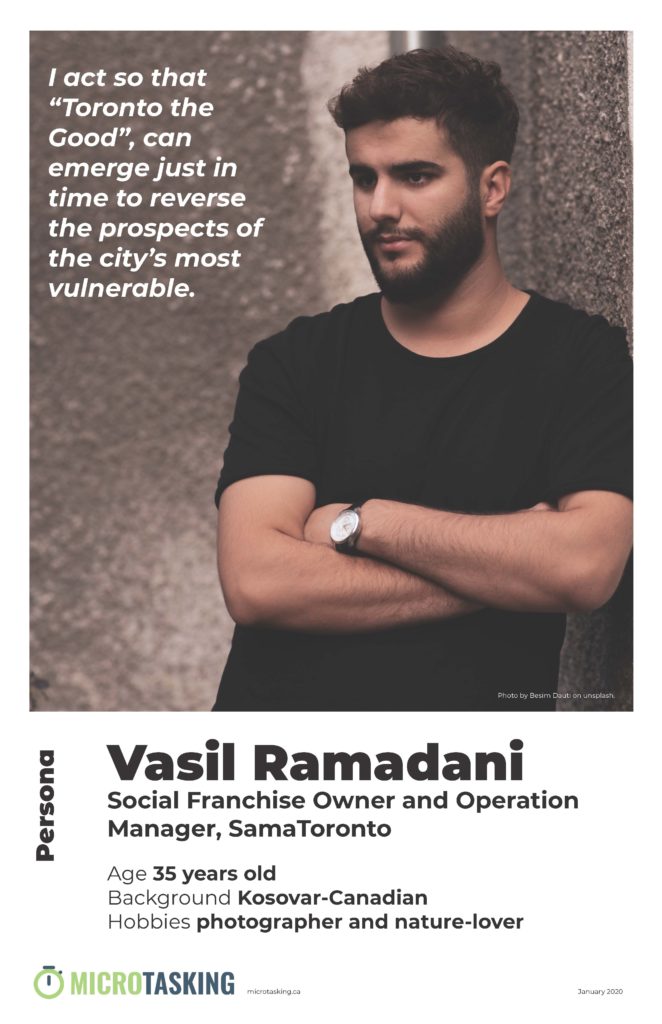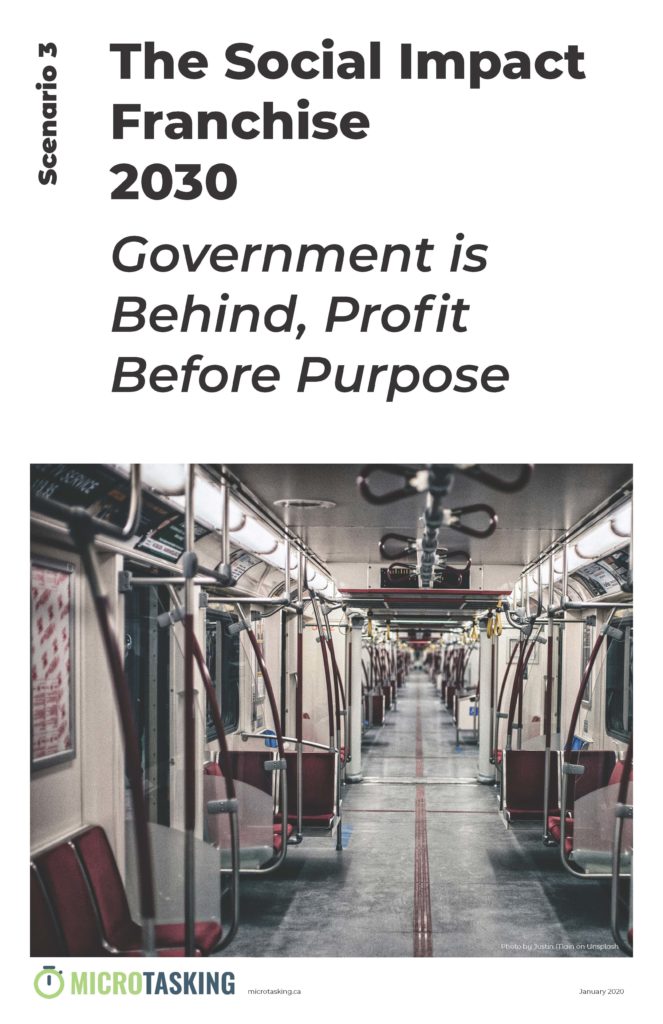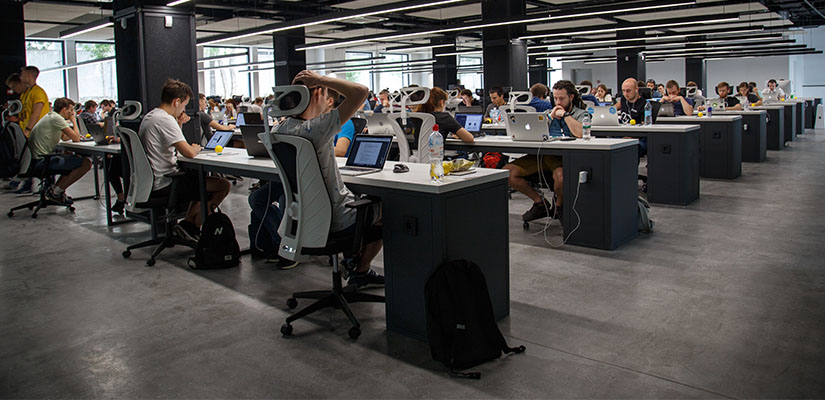
Scenario 3: The Social Impact Franchise
Government is behind + profit before purpose
In this scenario, the consequences of the gig economy are laid bare. Due to a lack of ridership revenue, infrastructure such as public transit collapses. Microwork enters industries such as education, health, and social services.
Note: Samakar is a fictitious organization. Samasource, a microwork platform designed for poverty reduction, is its inspiration. References are provided to support the plausibility of the scenario. There is no connection between Samasource and TWIG’s microtasking project.
Scenario 3, The Social Impact Franchise, was developed at the microworking session held on December 10, 2019. The related persona is Vasil Ramadani.
There is little progress by 2030
To paraphrase Edward Snowden, the law always lags behind technological innovation by at least a generation. Amazon’s Mechanical Turk started in 2005. By 2030 microwork has been around for almost a generation.
Finally, all levels of government are getting a handle on the impact of microwork. However, for too many Torontonians, it isn’t fast enough. The Canadian Minister of Labour is tasked with developing “greater labour protections for people who work through digital platforms, whose status is not covered by provincial or federal laws”. By 2030, there is little progress.
Human Resources firm, Randstad Canada, claimed that, by 2025, “the future of the workplace is agile.”
Regrettably, by 2025 agile translated into precarious for the average worker
Global corporations dominate microwork platforms and set the agenda. With little oversight, microwork enters industries such as education, health, and social services.
Unions focused on the gig economy, but not the precarious microwork underbelly. The Professional Institute of the Public Service of Canada’s (PIPSC) membership rejected a proposal to “organize professionals doing gig work in the private sector.”
The efforts that exist focus on highly skilled and specialized knowledge workers:
- UNIFOR’s Canadian Freelance Union
- CEP’s Canadian Freelance Union
- The Canadian Media Guild Freelance Branch
- Urban Worker Project
Due to limited resources, the decent work movement can’t deal with digital worker precarity.
The social impact franchise: Samakar
The emerging organized worker model doesn’t focus on microworkers, the most precarious gig workers. Lower-skilled workers can’t break into higher-paying jobs; no resources or solutions are available to address this issue.
The gig economy is experienced differently by different workers.
– Creig Lamb & Sarah Doyle. Future-proof: Preparing young Canadians for the future of work
In 2019 social impact franchise, SamaKar opened a Research and Development hub in Montreal. “Sama” is a Sanskrit word, meaning equal. “Karman” is Sanskrit for work. SamaKar runs as a hybrid model. A nonprofit owns the majority of the shares in the for-profit company, which raises capital from investors.
SamaKar also runs KarmaSchool and KarmaHub. It is a social impact microwork platform. Samakar moves people out of poverty through digital work and recognizes the inevitability of the emerging gig economy. It also shows freelancers how to thrive in it. Their work creates humane and fair work conditions for microworkers.
Samakar’s move into Canada is small and unnoticed, but not for long. In the early 2020s, all levels of government welcome big tech companies.
City infrastructure is privatized, touting the new smart, livable city. Surveillance capitalism by design is the norm. By 2025 an already unaffordable city has become unlivable for many:
- Those who can move to smaller communities.
- Those who remain live where they work.
This creates consequences. Public transit use is at an all-time low. Fewer people are driving to work. This has a net positive environmental impact, but public transit collapses due to a lack of ridership revenue.
There is increased workforce accessibility for some people
Through microwork, people with disabilities, older residents, youth, newcomers, and racialized communities gain labour market access. But they lack social capital and inclusion. They also have no access to stable career pathways. Precarity is the common bond that connects most workers. They feel isolated and disconnected from their city and each other.
Many realize that the microwork labour market is part of the problem. Industry demands acquiesce government institutions. Outdated and underfunded social services grapple with a profit-first mindset.
Either way, they are unable to patch the social safety net. The system has bottomed out, creating precarity for the vast majority of residents.
For some, barter economies emerge. Housing remains unaffordable. But there is a major shift toward a rental market built on co-operative housing models.
Toronto 2030
One year after the social impact franchise, Samakar opens
Torontonians are looking beyond mainstream institutions. They want a new culture, leaders, and a new social system. The decent work movement in Toronto is gaining ground.
Torontonians begin to realize that SamaKart is a valuable ally. Some are sceptical of solutions from business, but there is a need for businesses and people are looking for new models.
Working with Beyond Jobs out of the UK, SamaKar franchises its model into Toronto. SamaKarTO opens in 2029, aligned closely with the local decent work movement. It has the backing of SamaKar’s corporate partners and clients.
- KarmaSchoolToronto partners with communities, existing organizations, and organizations to support precarious microworkers directly.
- Subsidiary KarmaNorth handles the microwork platform. It brings Toronto, Canadian, and international companies on board to hire microworkers in Toronto.
In the absence of policy, the Canadian Ministry of Labour sets up funding
Then, they run pilot projects aimed at supporting microworkers. Private philanthropy also steps up. They have little impact.
By 2030, SamaKarTO represents a diversity of industries and sectors supporting microworkers and others in the gig economy. This base started with SamaKar corporate clients who are 50% of the Fortune 50. Then it quickly expanded into more Toronto-based employers.
It also works with local for-benefit corporations with a social purpose, including impact investors. This social impact franchise has grown and mobilized as a response to globalized for-profit corporate dominance.
SamaKarTO’s resources come from services provided to corporations and employers that use SamaKarTO’s services. Through its built-in Toronto solutions, the city’s microwork precariat is moving out of poverty.
SamaKarTO harnesses the realities of the gig and tech economy while offering a humane approach. It’s a strong new advocate for fair working conditions, decent work, and poverty reduction.
SamaKarTO moves SamaKar’s policy agenda forward. It supports local government and creates a livable city with decent work policies and protections.
Critical events
2020-2030: The social impact franchise
To develop the scenario, the group established critical events that might take place if government policies and regulations fall behind, and corporations continue to move in the direction of profit before purpose.
- 75% of Torontonians became precariously employed or unemployed.
- Government has become the biggest user of microworkers. Privatization of social services has begun.
- There is an increase in large global corporation dominated labour outsourcing.
- Increase in social isolation; more and more people work from home through portals.
- Sidewalk Toronto and projects like it are everywhere. I.E: the privatization of city infrastructure and services.
- A shift happens. People realize that the emerging microwork labour market is a disaster and they have more in common with each other than they thought.
- Government institutions collapse and are co-opted. They complement industry trends. Human/social services can’t patch the social safety net. This bottoms out precarity for the vast majority of residents. A revolution of values occurs.
- The local Decent Work movement gains prominence.
- New leaders, a new social system, and a new culture emerge, based on what was considered fringe approaches just 10 years earlier.
- Models such as SamaSource and Beyond Jobs expand into Toronto. They work with decent work advocates, activists, and academics. They also bring a globally responsible social impact franchise model to Toronto.
Contributors
This scenario was written by Marco Campana. It was developed at the Microwork Drivers Workshop on December 10, 2019. It’s based on the contributions of the following people. With thanks.
Alison Darcel
Diane Dyson, Director, Research & Public Policy The Neighbourhood Group
Eliana Trinaistic, MCIS Language Solutions
Mazher Jaffery
Michi Komori
Rosemary Richings, Rosemary Richings Content Creation & Strategy
Microtasking posters
Are you planning to hold a discussion on microwork? The posters make great prompts for your group.


You can download the full set of eight posters from the project toolkit.
All scenarios
TORONTO 2030: TALES OF POLICY AND PROFIT
Persona 1: Robin Esposito
Scenario 2: Profitably Public
Persona 2: Alyx Lee
Scenario 3: The Social Impact Franchise
Persona 3: Vasil Ramadani
Scenario 4: Corporate Cooperativism
Persona 4: Dan Yoon
- Microworking in Toronto - February 21, 2020
- Kristy Milland: The state of microwork - February 10, 2020
- Scenario 3: The Social Impact Franchise - December 21, 2019


























